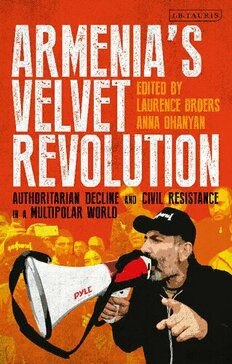
Armenia’s Velvet Revolution: Authoritarian Decline and Civil Resistance in a Multipolar World PDF
289 Pages·2020·6.187 MB·English
Most books are stored in the elastic cloud where traffic is expensive. For this reason, we have a limit on daily download.
Preview Armenia’s Velvet Revolution: Authoritarian Decline and Civil Resistance in a Multipolar World
Description:
In April 2018, Armenia experienced a remarkable popular uprising leading to the resignation of Prime Minister Serzh Sargsyan and his replacement by protest leader Nikol Pashinyan. Evoking Czechoslovakia’s similarly peaceful overthrow of communism 30 years previously, the uprising came to be known as Armenia’s ‘Velvet Revolution’: a broad-based movement calling for clean government, democracy and economic reform.This volume examines how a popular protest movement, showcasing civil disobedience as a mass strategy for the first time in the post-Soviet space, overcame these unpromising circumstances. Situating the events in Armenia in their national, regional and global contexts, different contributions evaluate the causes driving Armenia’s unexpected democratic turn, the reasons for regime vulnerability and the factors mediating a non-violent outcome. Drawing on comparative perspectives with democratic transitions across the world, this book will be essential reading for those interested in the regime dynamics, social movements and contested politics of contemporary Eurasia, as well as policy-makers and practitioners in the fields of democracy assistance and human rights in an increasingly multipolar world
See more
The list of books you might like
Most books are stored in the elastic cloud where traffic is expensive. For this reason, we have a limit on daily download.
